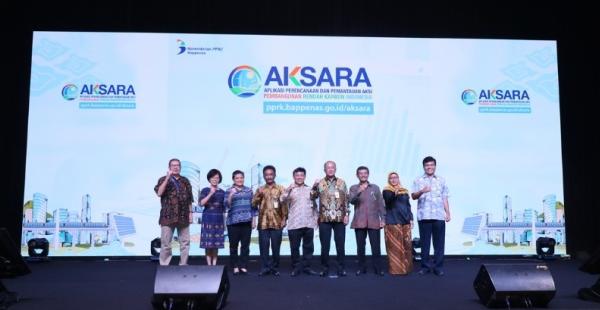
Monitoring Low Carbon Development Implementation using AKSARA
In response to the emergence of low carbon development as a new development paradigm, AKSARA has been developed to supersede the national monitoring, evaluation, and reporting application PEP Online. AKSARA accommodates the planning, monitoring, evaluation, and reporting of the implementation of the Low Carbon Development Indonesia.
The Government of Indonesia through the Ministry of National Development Planning (BAPPENAS) initiated a new development paradigm called Low Carbon Development Indonesia (LCDI) in response to the achieve the Sustainable Development Goals (SDGs) and implement the Paris Agreement. The LCDI aims to create economic growth and social welfare in harmony with environmental sustainability by considering carrying capacities in the formulation of policies and development planning. In its National Mid-term Development Plan 2020-20240 the government set a emission reduction target of 27.3% compared to the baseline for 2024. Within its Nationally Determined Contribution (NDC), Indonesia pledged to reduce GHG emissions by 29% compared to the business as usual (BAU) scenario in 2030 using own resources. Indonesia’s Vision 2045, a document that aims to project the status of the country 100 years after becoming an independent state, sets the unconditional reduction target of 34-41% by 2045.
Since 2012, BAPPENAS has actively monitored the implementation of the National/Regional Action Plan for Reducing Greenhouse Gas Emissions (RAN/RAD-GRK) through the Monitoring, Evaluation, and Reporting (PEP) mechanism. In 2017, this mechanism was enhanced to an online portal known as PEP Online. In line with the emergence of a new development paradigm, BAPPENAS has further developed the PEP online system to AKSARA. AKSARA is the abbreviation for Aplikasi Perencanaan dan Pemantauan Pembangunan Rendah Karbon Indonesia meaning Indonesian Low Carbon Development Planning and Monitoring Application.
AKSARA consists of 4 modules: (1) a planning module to help the government design and plan low carbon development interventions; (2) a monitoring module to help the government monitor the implementation of low carbon development activities; (3) an evaluation module to provide evaluations of low carbon development target achievement at the national and regional level; and (4) a reporting module to provide regular, comprehensive, and reliable information on low carbon development implementation processes to relevant stakeholders. With these four modules, AKSARA aims to provide a more integrated, accurate, comprehensive, consistent, and transparent monitoring and reporting system. It further facilitates processes to support the integrated national Monitoring, Reporting and Verification (MRV) system and the transition to the upcoming Enhanced Transparency Framework (ETF). AKSARA will also include a knowledge platform and e-learning module to enable stakeholders, particularly regional government officials, to build capacities through long-distance learning.

